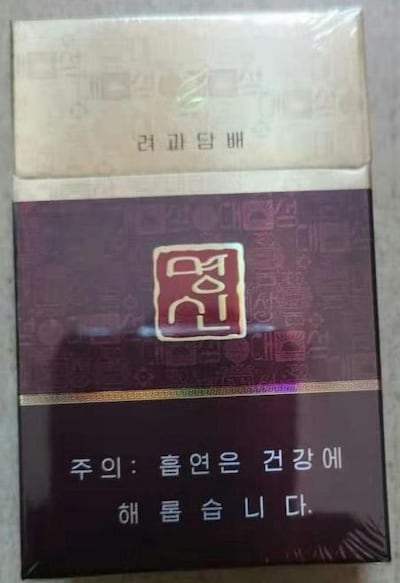Chinese smokers looking to save money on their costly habit are turning to smuggled North Korean cigarettes, which have become extremely popular in the border region, sources in China say. North Korean Myong Shin brand cigarettes are of similar quality to high-end Chinese cigarettes, but cost one-tenth the price, leading to speculation that the cigarette trade in China is opening new streams of revenue for cash-strapped North Korea.
“Myong Shin cigarettes are sold in Chinese cities on the North Korean border, including here in Dandong,” said a resident of the city in an interview with RFA’s Korean Service.
“They go for the very low price of 50 Chinese yuan [$6.99] per 10-pack carton. They are so cheap but they smell and taste the same as high-end Chinese cigarettes,” said the source.
“The better cigarettes in China cost 65 yuan ($9.09) for a pack, but a pack of Myong Shin is only 5 yuan [70 cents],” said the source.
The source said that the North Korean brand is especially popular among low-income Chinese smokers, who normally would settle for the low-quality discount Chinese brands, which would still be more expensive than the North Korean brand.
“It’s really gaining popularity with laborers and farmers. They prefer [Myong Shin] to their usual cheap Chinese cigarettes,” the source said.

Foreign cigarettes can be sold only in duty-free shops in China, usually at airports. But somehow packs of the North Korean brand are finding their way into the hands of cost-conscious Chinese smokers.
“They are smuggled in,” the source said, adding, “They can be found in North Korean goods stores and on the black market in Chinese border cities.”
But the source also revealed that the market for Myong Shin cigarettes is expanding beyond Chinese border cities as people more inland become aware of their high quality and low cost.
“North Korean cigarettes are now appearing in big cities like Beijing. In the areas far from the border where North Korea’s smuggling network has little influence, they are sold by courier delivery. In this case there is a bit of a markup and they’re sold for 100 yuan ($13.98) a carton,” said the source.
Price hikes fuel demand
Another source, also from Dandong, who is involved in smuggling activities cited recent price increases for China’s domestically produced cigarettes as a major reason for the rising popularity of Myong Shin cigarettes in China.
“Prices have risen significantly and they stopped making the low-cost brands which cost less than 100 yuan ($1.40) a pack,” said the second source.
“North Korea is making a whole lot of foreign currency by smuggling Myong Shin cigarettes into China. They are taking advantage of local tobacco market conditions,” the second source said.
The second source revealed that the market for North Korean cigarettes is opening up new business opportunities all over the border area.
“Many residents [of the border region] can now make a living off of the tobacco business. They can work in cigarette smuggling or on the retail side of things with no need for another job. It’s a great way to make a living because it doesn’t require any seed money to start up, since cigarettes aren’t sold on credit,” said the second source.
The second source explained how the cigarettes are usually smuggled into China, saying, “[they] are brought in by bundle merchants. Even though all North Korean cigarettes are smuggled in, I’ve never heard of [anyone] being caught and punished for smuggling cigarettes on either the Chinese or North Korean side of the border.”
The UN Security Council’s sanctions on North Korea, aimed at depriving the country of resources that could be used in its nuclear and missile programs, do not ban the export of North Korean cigarettes, but a source familiar with the situation in China said that foreign cigarettes can be legally purchased only in duty-free shops.
Reported by Joonho Kim for RFA’s Korean Service. Translated by Leejin Jun. Written in English by Eugene Whong.
